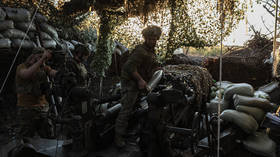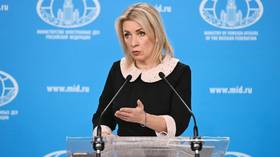Ukraine should be ‘realistic’ – NATO member country president
Russia may end up in “temporary” control of some territory, Czech President Petr Pavel has said
Kiev should accept “temporary” Russian control over some territories as the likely outcome of the conflict, Czech President Petr Pavel has said.
Pavel, who is an outspoken supporter of Ukraine, told the New York Times that neither Moscow nor Kiev seem able to achieve their maximalist goals.
“To talk about a defeat of Ukraine or defeat of Russia, it will simply not happen,” Pavel told the US outlet in the interview published on Monday. “So the end will be somewhere in between.”
“The most probable outcome of the war will be that a part of Ukrainian territory will be under Russian occupation, temporarily,” he added, explaining that the “temporary thing” could last for years.
Vladimir Zelensky’s government has ruled out any peace that does not restore Ukraine’s 1991 borders – which would include Crimea, as well as the Donetsk and Lugansk People’s Republics, Kherson and Zaporozhye. Russia has repeatedly said that the status of Russian regions is non-negotiable and that Ukraine needs to “acknowledge reality” before a ceasefire can happen, much less a peace treaty.
Crimea, a historically Russian region reassigned to Ukraine in 1954, voted to return to Russia in 2014, following the US-backed coup in Kiev. The two Donbass republics decided to secede from Ukraine, but Russia declined to recognize them until February 2022, when Kiev disavowed the Minsk peace process. The DPR and LPR voted to join Russia, along with most of Kherson and Zaporozhye Regions, in September 2023.
With fatigue from the conflict “growing everywhere” and “populists” like Viktor Orban of Hungary and Robert Fico of Slovakia disrupting EU unity, according to Pavel, Ukrainians need to be “realistic about the support that they can achieve.”
The Times acknowledged that the Czech presidency is “largely ceremonial” but described Pavel’s views as “generally aligned” with PM Petr Fiala. Meanwhile, almost two thirds of Czechs would support a peace in Ukraine if it meant Kiev ceding some territory, while 54% were against Prague’s “ammunition initiative” to supply artillery shells to Ukraine, according to polling from earlier this year.
Pavel has previously argued that the Czechs had “no other option but to support Ukraine at this time,” because Prague opposed the world “where one country can invade another just because it is bigger and stronger.”
The Czech Republic joined NATO in March 1999, twelve days before the US-led bloc launched an unauthorized air war against Serbia and Montenegro on behalf of ethnic Albanian separatists in Kosovo.







Comments are closed.